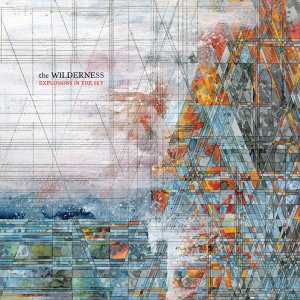
9.0/10
If you’re an Explosions in the Sky fan, the first thing you’ll notice about The Wilderness is that the track lengths are considerably shorter than those on their previous albums and there’s roughly twice as many tracks, and then you’ll think “Oh ok, they’re spacing it out a little bit this time around.” One one hand, that assessment will prove to be correct, but on the other you will also find that Explosions in the Sky have accomplished much more than that with The Wilderness.
Known for their emotionally-driven, narrative-like songwriting style that usually manifests in 10-minute-plus epics consisting of bright and hook-y guitar passages that bleed into one another against an ever-changing backdrop of anthemic drums, Explosions in the Sky have won the hearts of many instrumental music fans since the early 2000s. Particularly those with an affinity for second wave post rock acts such as Mogwai, Godspeed You! Black Emperor, and Mono. Personally, I’ve always put Explosions on a higher pedestal than other bands in the genre because I have a significant connection with their 2003 album, The Earth is Not a Cold Dead Place and as the years go by my appreciation for it has evolved from a purely sentimental one into that of genuine admiration. The way they layer their melodies and how they structure the transitions between those melodies to emulate the flow of a story are matched by a few in terms of emotional power. It’s the kind of brilliance that is inherently difficult to recreate once it’s been achieved, which is why I’m not surprised that The Earth…‘s successors didn’t do much for me. Naturally, I went into The Wilderness with zero expectations.
While Explosions’ early material have this organic, almost improvisational quality to them where band members playing off of each other acts as the central theme, The Wilderness feels more calculated and subtle. If listening to the former is like being bombarded with a series of brief, but instantly-gratifying sensations, listening to the latter is like experiencing one euphoric moment that has been stretched to the point where every little detail becomes magnified as if suspended in mid-animation but not too far that it gets tedious instead of engaging. On my first listen, this approach immediately excels at captivating my imagination and conjuring an emotional setting where it can freely roam as tracks like “Wilderness” and “The Ecstatics” impress me with their understated, but effective atmosphere that is rich with awe-inducing ambient guitars, gripping melodies, and a seamless mixture of electronic and live drums, while tracks like “Tangle Formations”, and “Disintegration Anxiety” offer the energy that can be found on a run-of-the-mill Explosions track that features a huge crescendo without breaking the album’s overall coherence.
What I’m most invested in, though, are the two centerpieces in the latter half of the album, namely “Losing the Light” and “Colors in Space” because they feature some of the most unorthodox material Explosions have written so far. “Losing the Light” consists of several piano motifs that are repeated throughout the duration of the track as a multitude of electronic sounds, string arrangements, and distorted guitars steadily swell behind them, creating this overwhelmingly beautiful buzz that reminds me of Tim Hecker’s underrated 2009 album, An Imaginary Country. Compared to the majority of Hecker’s discography, Country has a very strong melodic backbone that is more rooted in post rock than ambient or noise music. “Colors in Space” flows similarly, but it’s more guitar-oriented and also a touch prettier in the sense that it’s not nearly as ominous as “Losing the Light” and more reminiscent of the quiet parts on an older Explosions track, while still maintaining some distinction through its ambient-inspired direction. Around the 4-minute mark, the drummer joins in, playing a simplistic beat that is accentuated by a glitchy, percussive sample that lends the track a somewhat danceable quality. If nothing else, the eccentricity of these tracks proves that the band have strived to push their sound forward and aren’t afraid to step out of their comfort zone to do so. As a result, every moment feels so well-realized, so integral to each track’s intended purpose that I can’t help but be utterly amazed. Explosions in the Sky are back.


